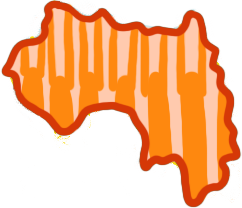Text
In this chapter, we are taking a step back to greetings. Not because you need to learn them, but because, as you may have noticed in your own learning or interactions, there is more to them than what we covered in "Greetings" and "Greetings Extended".
Specifically, we're going to cover the use or invocation of last names, which can show up in greetings like this (using the names Jalo and Kamara [often written Camara in French spelling] as examples):
– I ni ke!
– Nba! I ni ke!
– Nba! I Jalo!
– Nba! I Kamara!
To unpack this, I'll cover the following about what I will call last name shout-outs or last name invocations.
- Usage and context
- How-to with one person
- How-to with multiple people
- Variations
(NOTE: I have not been able to find a technical term in the academic literature for this cultural practice. And there isn't a specific folk term used in Manding that I know of. In my experience, people simply refer to it as "greeting someone" [ka mɔɔ fo or ka mɔɔ kɔndɔn].
Usage
Invoking your interlocutor's last name is common cultural and linguistic practice in Maninka (and Manding, in general), just like in many West African languages.
There isn't much like this in Western society, so it may take some getting used to, but its usage goes a long way to explaining why foreigners so frequently are given a West African nickname; without one you can't really properly participate in one of the major parts of greetings.
Before we jump into some grammar, let me point out one last thing: last name invocations don't need to occur at the end of a greeting necessarily. Just like benedictions and other speech acts that are part of greetings, they can appear throughout and possibly multiple times in a single exchange.
To one person
So how do you invoke someone's last name as part of greetings or any other interaction?
The formula is simple, you simply combine the word for i ( 'you') with the other person's last name (e.g., their jamu or si):
I+ Last Name
For example, let's take Jalo (often written in Diallo in French), which is my adoptive last name from my first host family in Burkina Faso:
I Jalo!
'To you, Jalo!'(as in, 'To you who belong to the particular lineage of people that are Jalo')
Upon hearing this, we respond using nba or nse depending on our gender identity as a man or woman, respectively. Then, typically, you would invoke the last name of your interlocutor. For instance (using Ture, often spelled Touré in French):
– I Jalo!
– Nba! I Ture!– To you, Jalo!
– Nba! To you, Ture!
Keep in mind that the translation, 'To you, XXX' that I've used here is quite rough. It's my best attempt to find an English saying that lines up partially with the Manding practice, but it's by no means perfect. In practice, translating last name invocations isn't what matters—it's your ability to use and recognize them with friends and acquaintances that will count!
One last thing: you might be wondering what to do if you don't know someone's last name. It's simple: you ask (see "Introductions")!
To multiple people
If you wish to invoke the last name of a group of people that all have the same last name—say a family, for instance—things are as simple as changing the initial pronoun to make it plural. That is, you switch from i ('you', singular) to álu ('you', plural).
After you do this, the group of people you are talking to will each respond individually with nba or nse, of course, depending on their gender.
For instance, with the last name Keyita (often spelled Keïta in French):
– Álu Keyita!
– Nba/Nse! I Jalo!– To you all, Keyitas!
– Nba/Nse! To you, Jalo!
Variations
You may also hear people respond with some things besides nba and nse.
These variations, like nba and nse, are gendered.
-
Male:
-
Mɔɔbalu= Lit. 'The big/grand people' (as in, 'The great forefathers [not me] engaged in the deeds that have made my lineage great') -
Marahaba= an interjection sometimes used to recognize greetings and last name shout-outs; it comes from the Arabic marḥaban meaning 'hello'.(Some etymologies actually trace
nbaback tomarahaba, but there are others as well.)
-
-
Female:
-
N m'à sɔdɔn= Lit. "I haven’t obtained it" (as in, ‘I, myself, didn’t engage in the deeds that have made my lineage great’)
Summary
Ayiwa! We covered the following in this chapter:
-
Last names are commonly invoked as a part of pleasant ritual of recognition that can take place one or multiple times during greetings between people
-
Last name invocation with one person is done by combining
i('you') with their last name:I Ture!
'To you, Ture!' -
You respond to a last name invocation using
nba/nse(as you would for a greeting likeI ni sɔɔma, etc.)– I Ture!
– Nba/Nse! -
You can invoke the last name of multiple people (if they have the same name) by switching the pronoun from singular to plural:
i→álu:– Álu Ture!
– Nba/Nse! I Jalo!– To you, Ture(s)!
– Nba/Nse! To you, Jalo!
Vocab
Coming soon n'Ala sɔnna!
- I [last name]!
- To you, [last name]!
- Álu [last name]!
- To you all, [last name]!
- Nba
- Male greeting response
- Nse
- Female greeting response
- Mɔɔbalu
- Male response (Lit. 'The great people')
- Marahaba
- Male response [from Arabic]
- N m'à sɔdɔn
- Female response (Lit. "I haven't obtained it")
- jamu
- last name
- I jamu/si?
- What's your last name?
- Jaanɛ
- Diané [French spelling]
- Jalo
- Diallo [French spelling]
- Kamara
- Camara [French spelling]
- Keyita
- Keïta [French spelling]
- Konate
- Konaté [French spelling]
- Kulubali
- Coulibaly [French spelling]
- Tarawele
- Traoré [French spelling]
- Ture
- Touré [French spelling]
Vocab list will be here someday!
Flashcards will be here someday!
Exercises
Exercises will be here someday!




